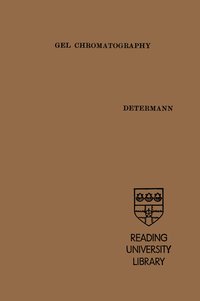
The efforts spent on many a scientific book cannot be justified, no matter how many words are said about it. The opposite is true for this book and a few brief remarks upon its publication. Within a short period of time, short even by all present standards, gel chromatography has gone through a development and experienced an acceptance that is unknown to any other method. From experience, the new and unique separation technique is today known and liked in all laboratories that are concerned with substances of high molecular weight; in others, the technique is known from hearsay, the least. Soon it became evident that a comprehensive coverage of the conceptual development, the theoretical principles, and the experimental technique of the new method would be desirable. This coverage is now offered by the book of an expert. Its author has personally participated in the development from its beginning and helped to promote it. He has made possible the gel chromatography, also of proteins, on thin layer plates; for lipophilic substances he has contributed considerably to the transition from water to organic solvent systems and developed theoretical concepts for a better understanding of the effects that are responsible for the separation. The book, so it appears to me, is pointing in new directions. The reader does not only expect a clear presentation of facts but also that of instructions for practical applications. Both these expectations have been met by the expert.